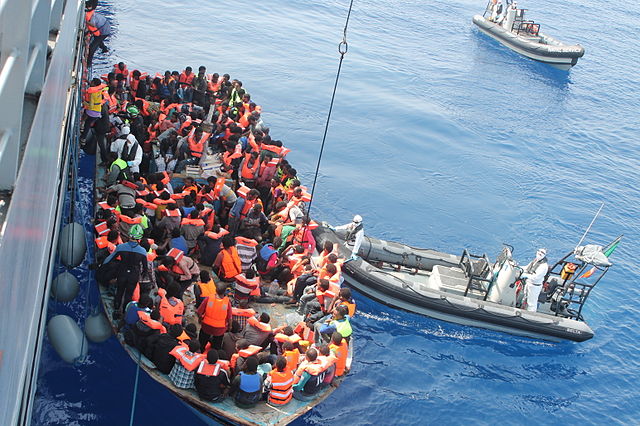After nearly more than eight years since Libya’s revolution and the death of Muammar Gaddafi, Libya continues to be impacted by internal struggles for power. It should be noted that since the death of the Libyan dictator, no force has managed to take control of the entire country. At present, Libya is divided between two rival authorities competing for power: on the one hand, the Government of National Accord (GNA) of Prime Minister Fayez al-Sarraj, recognised by the United Nations (UN) and based in the capital Tripoli, which controls a small area in western Libya, and on the other hand, a Parliament and a government, known as Tobruk (named after a port city on the eastern Libyan coast, where they are based), and their armed wing, the Libyan National Army (LNA), led by Marshal Khalifa Haftar, which controls about 85% of the Libyan territory.
The fighting between the two sides has intensified particularly since Marshal Haftar launched an offensive on Tripoli in April 2019. The latter justified his offensive to purge Tripoli and its surroundings of Islamist militias allied to the GNA. Indeed, the GNA Prime Minister is particularly supported by Islamist groups in the city of Misrata and by foreign powers, notably Turkey, which has sent its military advisers and special forces as well as pro-Turkish Syrian fighters to Libya. As regards to Marshal Haftar, he enjoys the support of the United Arab Emirates and Egypt, as well as Russian mercenaries from the Wagner group, a group close to the Kremlin. In view of the chaos in Libya, due to its geographic proximity to Europe and its strategic position, it is important for Europe to unite to ease tensions in Libya.
Intensified tensions could lead to a new migration crisis
A deterioration of the security situation in Libya could lead to a new migration crisis in Europe. This remains plausible in view of the fact that cargo flights have been observed at Libyan airports in the west and the east, providing both sides with advanced weapons, armoured vehicles, advisers and fighters despite the fact that the countries involved in the conflict have recently committed themselves to respecting the embargo on arms deliveries to Libya. It should be noted that a Turkish drone was shot down by Marshal Haftar’s forces on Jan. 22. Moreover, artillery fire was heard in the outskirts of Tripoli on Jan. 25 and fighting broke out near Sirte on Jan. 27. Europe cannot afford to be rocked by a new migration crisis such as the one it experienced between 2015 and 2016 as a result of the Syrian conflict. The security imbalance of the first years of the Syrian civil war led to the emergence of Islamist and jihadist groups, notably embodied by Daesh, which took advantage of the security chaos in Syria and the migration crisis to infiltrate the group’s jihadists to Europe in order to commit terrorist attacks. Indeed, the bombing of the Manchester Arena concert in 2017 was claimed by Daesh.
Italy is one of the European countries most affected by illegal immigration from Libya. The island of Lampedusa, located 150 kilometres off the Tunisian coast, recorded 600,000 migrants between 2014 and 2017. Italy’s foreign policy regarding Libya is strongly marked by a realist vision, including the defence of its migration as well as economic interests. In the hope of preventing future migration flows to Lampedusa, the Italian government has signed a cooperation agreement with the GNA to reduce illegal immigration from Libya in 2017. Italy’s major economic interests in Libya are mainly represented by the Italian energy group ENI, which is the main exploiter of Libya’s hydrocarbon reserves. In this sense, any threat to the fragile political stability existing in Tripoli is interpreted by the Italian authorities as a threat to the pre-eminence of Italian economic interests in Libya.
The importance of stability in Libya is also shared by the French and German leaders. The stability of Libya is in line with the desire of France and Germany to prevent the emergence of new jihadist zones in the Middle East. Indeed, the recent involvement of German diplomacy in the Libyan crisis is mainly aimed at supporting the efforts of the United Nations special envoy, as at the Berlin summit, to limit foreign interference in the Libyan conflict and to establish an arms embargo on Libya in the hope of creating the necessary conditions for a resumption of the inter-Libyan dialogue. This position was also shared by France at the Berlin Summit, although it must be acknowledged that it has also been complicit in the past in tacit support to Marshal Haftar. The French Government desires that Libya regains the authority of its security institutions so that it can better protect its southern borders with the countries of the Sahel, which are strongly confronted by terrorism attacks from jihadist groups. It should be noted that in 2019, Daesh was recruiting fighters in the ungovernable areas of southern Libya. It is therefore, plausible that a resumption of hostilities between the forces of Marshal Haftar and Toubou tribal forces could allow the jihadist groups to regain ground, which would increase the terrorist threat in Libya and neighbouring countries, particularly in northern parts of Chad and Niger. These Sahelian countries are already struggling to eliminate the jihadist threat from the Islamic State of the Great Sahara (ISGS).
France, which militarily supports the G5 Sahel countries in the fight against jihadism, is naturally concerned about the potential emergence of a jihadist arc linked to Daesh originating in the Sahel and extending to the countries of North Africa. The scenario feared by France and the European Union would be the emergence of a migratory wave from the two African zones to the European continent where jihadist fighters could infiltrate the migratory flows.
Restoring Europe’s voice in Libya
In view of the growing involvement of Russia and Turkey in Libya, it is important that the European powers unite on the diplomatic front in order to find a political solution to the Libyan crisis. This is necessary given Europe’s geographical proximity and strategic interests in Libya, particularly in the fight against terrorism. In this context, it is important that the European powers approve the sending of armed forces to the Libyan front in order to ease tensions between the GNA and the LNA. It will also be important for Europe to advocate the disarmament of the Madkhali militias which are represented in both Libyan factions. It should be noted that the Madkhalis are those who interpret an ultra-Orthodox vision of Islam. One of the most important militias in Tripoli, the Rada Force, led by Abderraouf Kara, is the main Madkhali militia which provides security for Prime Minister Fayez al-Sarraj and ensures that the values associated with Salafism are respected within Tripolitan society. In the eastern part of the country, the Madkhalis militias are one of the pillars of the LNA. Cyrenaica’s Madkhalis are influential within religious institutions and ensure that the values associated with Salafism are respected in the public sphere. The resumption of dialogue between the two Libyan factions is, therefore, an important objective for Europe in order to prevent the possibility of the Madkhalis ascending to power and increasing the destabilisation of the Mediterranean region.
The views and opinions expressed in this article are those of the author and do not necessarily reflect the official policy or position of The Geopolitics.

The author has recently graduated with a Masters in International Relations from the University of New South Wales, Sydney, Australia. His research interests are focussed on geopolitical and security issues specific to the Middle East and their impact on European powers.


